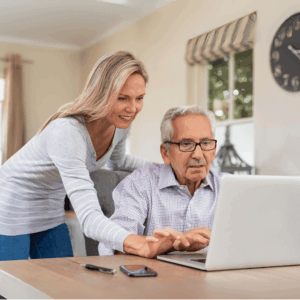Exercise and nutrition are essential parts of a healthy lifestyle throughout one’s life, and as we get older, our requirements change. With one Australian suffering from a heart attack or stroke every four minutes and heart disease still the leading cause of death, it is a timely reminder that regular exercise and a healthy diet are key factors in reducing heart disease1. A growing body of research shows that exercising regularly is especially important for seniors who are opting for a more active lifestyle instead of a sedentary one.
Our biology changes as we get older, which is all the more reason to remain as active as possible, without overdoing it, especially during the summer months when we are most at risk of dehydration! In older adults, exercise helps us live a longer, healthier and more fulfilling lives. The first step anyone can take to get moving is by simply getting started. The good news is that you do not need to do it alone and having a home care agency such as Home Care Assistance can help you or your loved one. From incorporating physical activity into your daily routine with light exercise and outdoor activity, through to travel assistance to senior exercise classes and/or physiotherapy appointments.
What are the benefits of moving?
Physical activity is essential to healthy ageing as it helps prevent or delay risk of disease. Not only are you less likely to have a heart attack or develop heart disease as the result of regular physical activity, but you are also likely to experience the following benefits:
- Prevents and counteracts disease such as obesity, diabetes, cholesterol, high blood pressure and Alzheimer’s Disease
- Exercise means more independence, where you are less likely to depend on anyone
- Helps improves balance therefore lessening the risk of falling
- Improves digestive function by keeping the metabolism up
- Improves brain function and overall mental wellbeing
- Strengthens muscle tone and bone density.
How much physical activity do you need?
Older Australians aged 65 years plus, are advised by the Australian Physical Activity Guidelines, to do at least 30 minutes of moderate exercise most days. There are many effective ways to exercise in the comfort and safety of your home from using a chair to sit and complete exercises to standing and holding onto furniture to going for a walk. Chronic health conditions may impact your ability to meet the above recommendations, but just be as active as your abilities and health conditions allow you to be, by simply moving your body.
Getting started
- Always start small, slow and gradually build up over time. Incorporate balance and flexibility exercises into your routine
- Exercise shouldn’t be a bore. Find an activity that you love doing and find enjoyable
- Comfortable clothing and most importantly, shoes, are key when it comes to exercising
- Consider physiotherapy especially when recovering from an injury or if you’re nervous to start increasing your mobility. Your Home Care Assistance Care Worker can help organise physiotherapy and transport you to and from your appointments.
Types of exercise
Exercise can include anything that involves the body moving – even if you’re sitting in a chair – and doesn’t have to be anything strenuous. Walking is so underrated, yet it’s the single most beneficial form of exercise there is. Here’s a FUN FACT. Did you know that if you walk 7,500 steps per day, that by the time you are 80 years old, you would have taken approximately 216,262,500 steps?!2 Other types of low impact exercises to consider include:
- Water aerobics
- Tai Chi
- Yoga
- Walking
- Cycling
At Home Care Assistance we have a holistic approach to healthy longevity based on an evidence-based program – our Balanced Care Method™. Our Care Workers are trained in this methodology to focus on physical exercise, healthy nutrition, cognitive stimulation, social engagement, and a purposeful and calm lifestyle with in-home care. Don’t become a statistic. With only a third of our life span determined by our genetics, and two-thirds determined by lifestyle factors, it’s never too late to get moving.
Remember to prioritise being active as it can make your life, or that of a loved one, better and you’ll enjoy the benefits for the rest of your life. Simply moving more every day is one of the best habits you can have. Don’t feel disheartened if you are feeling anxious about incorporating physical activity into your lifestyle. At Home Care Assistance we are experts in helping improve the lifestyle of those ageing in place, by incorporating physical activity and help boost overall physical and mental health.
Get in touch with a Home Care Assistance provider near me and get moving!
References
1 https://www.heartfoundation.org.au/bundles/for-professionals/key-stats-cardiovascular-disease
As a leading age care provider, Home Care Assistance offers tailored in-home care services for older Australians, enabling them to live happier and healthier lives in the comfort of their own homes.
We offer private and government subsidised Care Packages and have office locations that are a registered NDIS provider. Our Care Workers undergo extensive training in order to deliver unmatched in-home aged care services where people can continue ageing in place. We are proud ambassadors of the My Aged Care government funded aged care program, enabling Australians to successfully navigate the process and gain approval for in-home care support packages. Home Care Assistance offers hourly care, specialised care, Alzheimer’s and Dementia care, hospital to home care, and 24 hour in home care.













